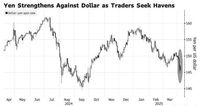On Monday, April 7, 2025, the U.S. dollar experienced a notable decline against the Japanese yen, falling by 0.7% to reach 145.91 yen in early Singapore trading. This drop follows a significant dip last Friday, when the dollar fell to 144.56 yen, marking the first time it has fallen below 145 yen since October 2, 2024. The decline in the dollar's value comes as U.S. Treasury Secretary Bentson made efforts to allay investor fears regarding a potential economic recession in the United States.
In addition to the dollar's struggles, the British pound saw a rise of over 1% against the yen, reaching 187.447 yen, while the euro fell by 1.0% against the yen, settling at 159.31 yen. The dollar also fell 0.4% against the Swiss franc, which reached 0.8573, and the euro dropped 0.3% against the Swiss franc, closing at 0.94.
Market sentiment has been heavily influenced by ongoing trade tensions and tariff threats, which have prompted traders to seek refuge in safe-haven currencies like the yen and the Swiss franc. The Japanese yen rose 1% against the U.S. dollar, while the Swiss franc strengthened by 0.7%. Meanwhile, the Australian dollar faced a decline of 0.7%, marking the largest drop among major developed market currencies.
The recent fluctuations in currency values reflect a growing apprehension among investors about the potential for a global economic slowdown, particularly as U.S. officials have shown little willingness to compromise on tariffs imposed recently. Treasury Secretary Bentson indicated that trade issues are unlikely to be resolved in the short term, stating, "Trade problems cannot be negotiated in days or weeks." Such comments have raised concerns about the future of international trade and economic stability.
As the trade war escalates, the S&P 500 index saw a sharp decline during early Asian trading, further signaling investor unease. The Australian dollar experienced its most significant drop since October 2008, highlighting the impact of these developments on smaller, trade-dependent economies.
AT Global Markets chief analyst Nick Twidale commented on the situation, saying, "If Trump maintains a hard line, we will incur more risks. Negotiations will take months, which is not good for global trade and may not meet investors' expectations of this administration." This sentiment underscores the broader implications of the current trade climate, as investors brace for potential challenges ahead.
In this environment of uncertainty, traders are increasingly turning to the Japanese yen and Swiss franc as safe-haven assets. The yen's strength is particularly notable, as it has gained traction amid fears of a prolonged trade conflict. The Swiss franc has similarly benefited from the flight to safety, as investors seek stability in the face of rising geopolitical tensions.
Meanwhile, Bitcoin has also faced challenges, maintaining a decline of over 4% and hovering near a low of $78,640.50. This downturn in cryptocurrency values mirrors the broader market's volatility and reflects investor caution in uncertain times.
As the situation unfolds, market analysts will be closely monitoring the responses from U.S. officials and the potential impact on global economic dynamics. With trade tensions continuing to escalate, the implications for currency markets and international trade remain significant.
In conclusion, the interplay between currency values, trade tensions, and investor sentiment highlights the complexities of the current economic landscape. As traders navigate these challenges, the strength of safe-haven currencies like the yen and Swiss franc will likely continue to be a focal point in the weeks ahead.




